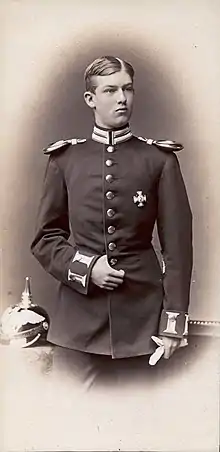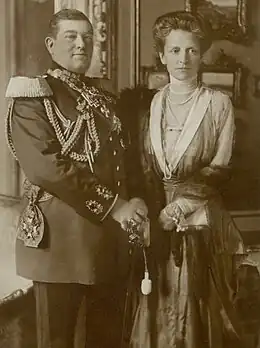William, Prince of Hohenzollern
William, Prince of Hohenzollern (German: Wilhelm August Karl Joseph Peter Ferdinand Benedikt Fürst von Hohenzollern) (7 March 1864 in Schloss Benrath, near Düsseldorf – 22 October 1927 in Sigmaringen) was the eldest son of Leopold, Prince of Hohenzollern and Infanta Antónia of Portugal.
| William | |||||
|---|---|---|---|---|---|
 | |||||
| Prince of Hohenzollern | |||||
| Tenure | 8 June 1905 – 22 October 1927 | ||||
| Predecessor | Leopold | ||||
| Successor | Frederick | ||||
| Born | 7 March 1864 Schloss Benrath, near Düsseldorf, Rhine Province, Prussia | ||||
| Died | 22 October 1927 (aged 63) Sigmaringen, Province of Hohenzollern, German Reich | ||||
| Spouse | |||||
| Issue | Augusta Victoria, Queen of Portugal Frederick, Prince of Hohenzollern Francis Joseph, Prince of Hohenzollern-Emden | ||||
| |||||
| House | Hohenzollern | ||||
| Father | Leopold, Prince of Hohenzollern | ||||
| Mother | Infanta Antónia of Portugal | ||||
William was an older brother of Ferdinand of Romania. His first cousins included (among others) Carlos I of Portugal, Albert I of Belgium, Frederick Augustus III of Saxony, and Princess Maria Josepha of Saxony.
Between 1880 and 1886, William was heir presumptive to the Romanian throne. On 20 December 1886, he renounced his rights to the throne in favor of his brother Ferdinand.[1][2]
Family

On 27 June 1889, William married Princess Maria Teresa of Bourbon-Two Sicilies. Her parents were Prince Louis, Count of Trani and Mathilde Ludovika, Duchess in Bavaria. Louis was the eldest son of Ferdinand II of the Two Sicilies and his second wife Archduchess Maria Theresa of Austria. Mathilde was the fourth daughter of Maximilian, Duke in Bavaria and Princess Ludovika of Bavaria. William and Maria Teresa had three children:
- Augusta Victoria of Hohenzollern (19 August 1890 – 29 August 1966). Married first Manuel II of Portugal and secondly Robert, Count Douglas.
- Prince Frederick Victor of Hohenzollern (30 August 1891 – 6 February 1965). Married Princess Margarete Karola of Saxony. She was a daughter of Frederick Augustus III of Saxony and Archduchess Luise, Princess of Tuscany.
- Prince Francis Joseph of Hohenzollern, adopted the title Prince of Hohenzollern-Emden (30 August 1891 – 3 April 1964). He married Princess Maria Alix of Saxony, also a daughter of Frederick Augustus III of Saxony and Archduchess Luise, Princess of Tuscany.
William succeeded his father as Prince of Hohenzollern on 8 June 1905. Maria Teresa died on 1 May 1909.
On 20 January 1915, Wilhelm married secondly Princess Adelgunde of Bavaria. She was a daughter of Ludwig III of Bavaria and Maria Theresia of Austria-Este. There were no children from this marriage.
William's title was effectively abolished[3] with the collapse of the German Empire. He continued to use his princely surname, which was permitted by the constitution.
Romanian succession
On 22 November 1880, William's father, Prince Leopold, renounced his rights to the succession of the principality of Romania[4] in favour of his sons.
Having become familiar with the situation there, the 22-year-old William renounced all rights to the succession of the kingdom (since 1881) of Romania by a letter in French dated on 20 December 1886.[1]
In 1914, upon the death of king Carol I of Romania, William's next brother Ferdinand became king.
Honours and awards
- German orders and decorations[5]
 Hohenzollern-Sigmaringen: Cross of Honour of the Princely House Order of Hohenzollern, 1st Class with Swords
Hohenzollern-Sigmaringen: Cross of Honour of the Princely House Order of Hohenzollern, 1st Class with Swords.svg.png.webp) Prussia:
Prussia:
- Knight of the Black Eagle, with Collar[6]
- Grand Cross of the Red Eagle
- Grand Commander of the Royal House Order of Hohenzollern
- Iron Cross (1914), 1st Class
- Military Honor Medal
- Red Cross Medal, 1st Class
 Anhalt:
Anhalt:
.svg.png.webp) Baden:
Baden:
- Knight of the House Order of Fidelity, 1884[8]
- Knight of the Order of Berthold the First, with Golden Collar, 1884[8]
- Grand Cross of the Military Karl-Friedrich Merit Order
.svg.png.webp) Bavaria:
Bavaria:
- Knight of St. Hubert, 1905[9]
- Grand Cross of the Military Merit Order, with Swords
 Brunswick:
Brunswick:
- Grand Cross of Henry the Lion
- War Service Cross
.svg.png.webp)
.svg.png.webp)
.svg.png.webp) Ernestine duchies:
Ernestine duchies:
- Grand Cross of the Saxe-Ernestine House Order, 1887;[10] with Swords, 1914
- Duke Ernst Medal with Crown (Altenburg)
- Cross for Merit in War (Meiningen)
 Hesse and by Rhine:
Hesse and by Rhine:
- Grand Cross of the Ludwig Order, 12 July 1906[11]
- Medal of Bravery
 Mecklenburg:
Mecklenburg:
- Grand Cross of the Wendish Crown, with Crown in Ore
- Gold Military Merit Cross (Schwerin)
- Cross for Distinction in War, 1st Class (Strelitz)
 Oldenburg: Grand Cross of the Order of Duke Peter Friedrich Ludwig, with Golden Collar and Crown
Oldenburg: Grand Cross of the Order of Duke Peter Friedrich Ludwig, with Golden Collar and Crown.svg.png.webp) Saxe-Weimar-Eisenach: Grand Cross of the White Falcon
Saxe-Weimar-Eisenach: Grand Cross of the White Falcon.svg.png.webp) Saxony: Knight of the Rue Crown[6]
Saxony: Knight of the Rue Crown[6] Württemberg: Grand Cross of the Württemberg Crown, 1906;[12] with Swords
Württemberg: Grand Cross of the Württemberg Crown, 1906;[12] with Swords
- Foreign orders and decorations[13]
 Kingdom of Romania:
Kingdom of Romania:
.svg.png.webp) Austria-Hungary:[14]
Austria-Hungary:[14]
.svg.png.webp) Belgium: Grand Cordon of the Order of Leopold
Belgium: Grand Cordon of the Order of Leopold Principality of Bulgaria: Grand Cross of St. Alexander
Principality of Bulgaria: Grand Cross of St. Alexander.svg.png.webp) Kingdom of Greece: Grand Cross of the Redeemer
Kingdom of Greece: Grand Cross of the Redeemer_crowned.svg.png.webp) Kingdom of Italy: Knight of the Annunciation, 28 October 1913[15]
Kingdom of Italy: Knight of the Annunciation, 28 October 1913[15]
.svg.png.webp) Holy See: Grand Cross of the Holy Sepulchre of Jerusalem
Holy See: Grand Cross of the Holy Sepulchre of Jerusalem.svg.png.webp) Sovereign Military Order of Malta: Grand Cross of Honour and Devotion[6]
Sovereign Military Order of Malta: Grand Cross of Honour and Devotion[6].svg.png.webp) Ottoman Empire: Order of the Medjidie, 1st Class
Ottoman Empire: Order of the Medjidie, 1st Class.svg.png.webp) Kingdom of Portugal:
Kingdom of Portugal:
- Grand Cross of the Sash of the Two Orders
- Grand Cross of the Tower and Sword, with Collar
 Russian Empire: Knight of St. Andrew[6]
Russian Empire: Knight of St. Andrew[6].svg.png.webp) Spain:
Spain:
- Grand Cross of the Order of Charles III, with Collar, 1907[16]
- Grand Cross of Military Merit
 French Tunisia: Grand Cordon of the Order of Glory
French Tunisia: Grand Cordon of the Order of Glory
Ancestry
| Ancestors of William, Prince of Hohenzollern |
|---|
References
- Renunciation letter of Guillaume de Hohenzollern, in French, dated on 20 December 1886
- (in French) Gheorghe Bengescu (1907)- Bibliographie franco-roumaine depuis le commencement du XIXe siècle jusqu'à nos jours.
- "Weimar Constitution of 1919". Cornell University. July 12, 2020.
- Renunciation letter of Leopold de Hohenzollern, in French, dated on 22 November 1880"
- Handbuch über den Königlich Preußischen Hof und Staat (1918), Genealogy p.6
- Justus Perthes, Almanach de Gotha 1922 (1922) p. 77
- Hof- und Staats-Handbuch des Herzogtums Anhalt (1894), "Herzogliche Haus-Orden Albrecht des Bären" p. 17
- Hof- und Staats-Handbuch des Großherzogtum Baden (1896), "Großherzogliche Orden" pp. 62, 77
- Hof- und Staats-Handbuch des Königreich Bayern (1906), "Königliche Orden" p. 9
- Staatshandbücher für das Herzogtum Sachsen-Coburg und Gotha (1890), "Herzogliche Sachsen-Ernestinischer Hausorden" p. 46
- "Ludewigs-orden", Großherzoglich Hessische Ordensliste (in German), Darmstadt: Staatsverlag, 1914, p. 6
- "Königliche Orden", Hof- und Staats-Handbuch des Königreich Württemberg, Stuttgart: Landesamt, 1907, p. 31
- Handbuch über den Königlich Preussischen Hof und Staat, 1908, p. 5
- "Ritter-Orden", Hof- und Staatshandbuch der Österreichisch-Ungarischen Monarchie, 1918, pp. 51, 55, 74, retrieved 5 July 2020
- Italy. Ministero dell'interno (1920). Calendario generale del regno d'Italia. p. 58.
- "Real y distinguida orden de Carlos III". Guía Oficial de España (in Spanish). 1910. p. 160. Retrieved 4 July 2020.
- "The Book of Kings: A Royal Genealogy" by C. Arnold McNaughton.
